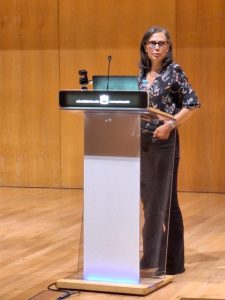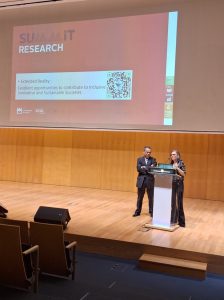- needhelp@info.com
- 88 broklyn silver street, USA
18Jul2023
-
18Jul2023
IEETA Discusses the Use of Extended Reality (XR) Technologies for Inclusive, Innovative, and Sustainable Societies
IEETA discusses the use of Extended Reality (XR) technologies for Inclusive, Innovative, and Sustainable Societies. During the Research Summit 2023 (https://www.ua.pt/en/researchsummit) held in July at the University of Aveiro, the IEETA – Institute of Electronics and Informatics Engineering of Aveiro (https://www.ieeta.pt), represented by Beatriz Sousa Santos, Associate Professor with Aggregation at the DETI – Department of Electronics, Telecommunications and Informatics from UA, presented a set of contributions of Extended Reality (XR) technologies for Inclusive, Innovative, and Sustainable Societies.


Through several examples of recent projects, developed in a multidisciplinary context by researchers from the VAR Lab group (https://sites.google.com/view/varlab/home) at IEETA, it was possible to demonstrate the utility of XR technologies, which encompass technologies such as Virtual Reality (VR), Augmented Reality (AR), and Mixed Reality (MR).
These XR technologies have been gaining visibility due to their innovative characteristics and applicability in various fields. Currently, areas such as Industry 4.0, Education 4.0, Smart Homes, Rehabilitation, or scenarios of Remote Collaboration, among others, see the concept of XR as a tool that enables a wide range of advantages during the execution of various human activities.
For example, in education, the use of XR can create immersive and interactive learning environments for all learning levels. In environmental sustainability, XR can help increase awareness and reinforce conservation efforts. Regarding accessibility, this technology can break physical barriers and provide access to experiences and opportunities for people with disabilities. XR solutions can also be used to support remote collaboration scenarios, reducing the need for travel and associated carbon emissions.
Despite this interest, measures should be taken to ensure that the use of these types of technologies follows a set of guidelines to safeguard ethics, well-being, and human safety, emphasizing that various research opportunities exist around these topics in order to accelerate the adoption of these technologies by a wider audience.
#IEETA, #DETI, #LASI, #VARLab, #researchsummit, #extendedreality #xr
